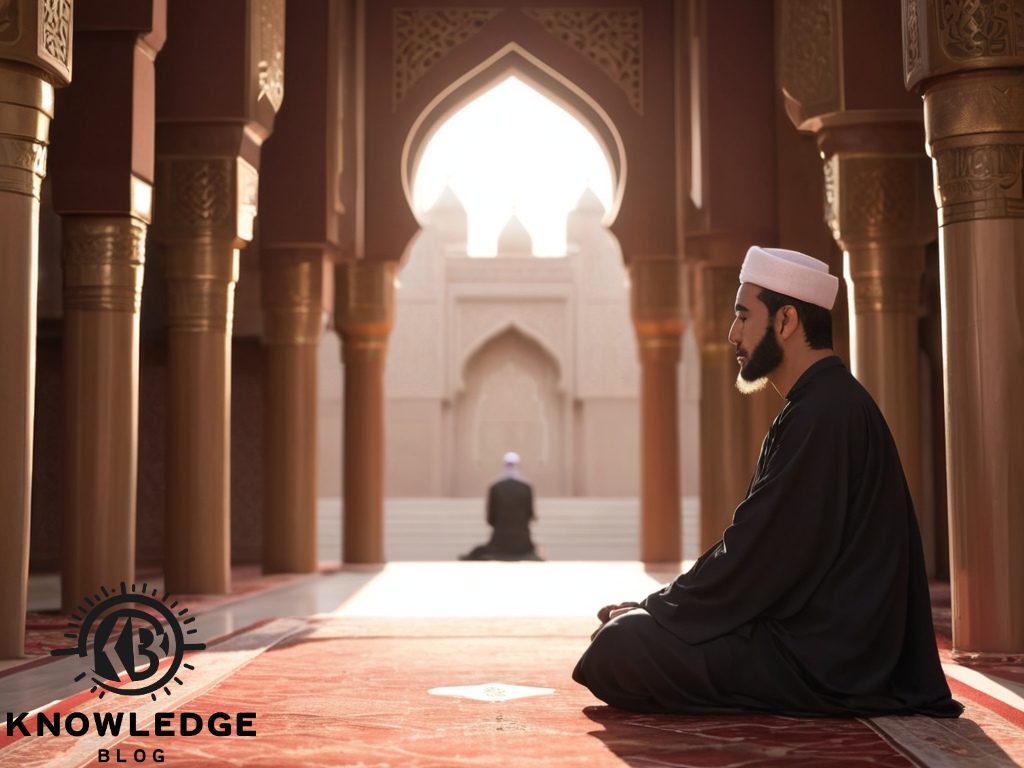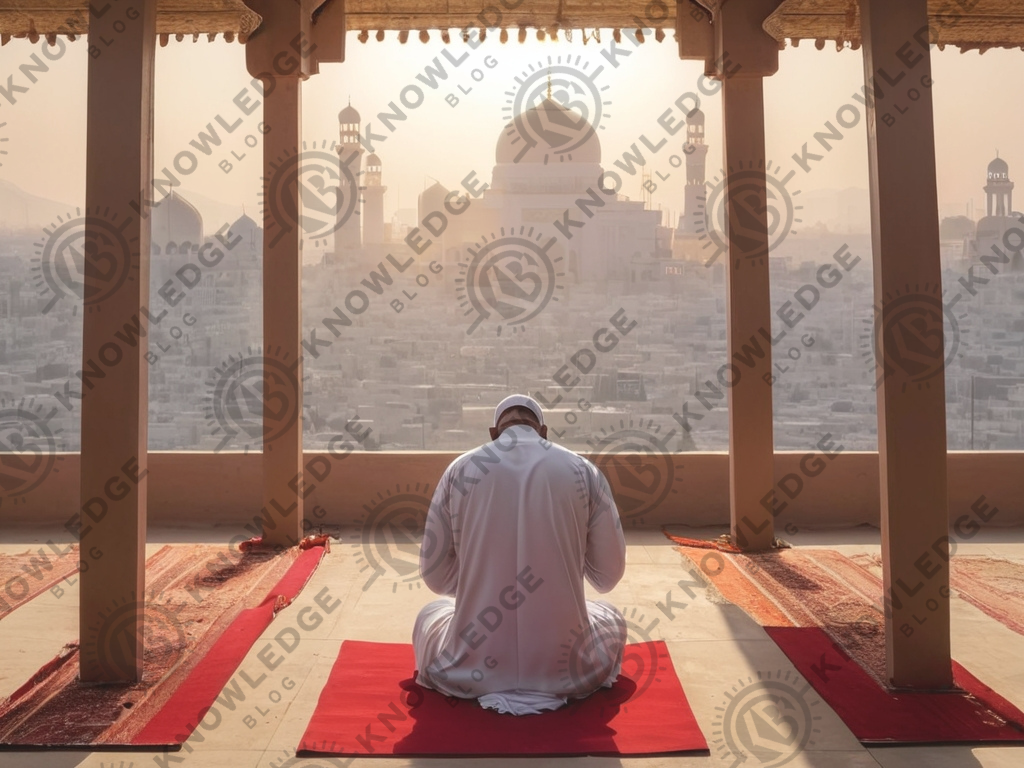What Is Islamic Way of Meditation?

In the diverse tapestry of spiritual practices across cultures and religions, the Islamic way of meditation emerges as a profound and multifaceted approach to seeking closeness with the Divine.
In this article today, we are going to talk about Islamic way of meditation and the benefits of it.
Table of Contents
ToggleMeditation meaning
Meditation, a practice as ancient as time itself, serves as a gateway to inner tranquility and heightened self-awareness. This revered tradition transcends mere relaxation, inviting practitioners on a journey to explore the depths of their being.
It’s a form of mental exercise that hones the mind’s focus, freeing it from the relentless grip of tumultuous thoughts and emotions. Through various techniques, including focused attention, mindful observation, and deep breathing, individuals learn to cultivate a state of serene alertness.
Islamic way of meditation
Dhikr
Dhikr, an Arabic term meaning “remembrance,” stands as a cornerstone of spiritual practice in Islam, embodying the Islamic way of meditation. This profound form of worship centers on the act of remembering and glorifying Allah through the recitation of His names, supplications, and verses from the Quran. Dhikr transcends mere verbal utterance, fostering a deep, meditative connection between the believer and the Divine.
Salah
Salah, the Islamic practice of formal prayer, is a fundamental pillar of the faith, deeply embedded in the life of every Muslim. It is a ritualistic form of worship that involves specific physical movements and recitations, performed five times a day at prescribed times: at dawn (Fajr), noon (Dhuhr), mid-afternoon (Asr), sunset (Maghrib), and evening (Isha).
These prayers serve as a constant reminder of the believer’s connection to Allah, fostering a disciplined spiritual routine that structures the day around moments of reflection, gratitude, and divine communion.
The significance of Salah extends beyond its role as an act of religious obligation. It is a profound spiritual practice that nurtures the soul, purifies the heart, and disciplines the mind. Through Salah, Muslims affirm their faith, seek guidance, express their dependence on Allah, and cultivate a personal relationship with their Creator. It is both a personal conversation with Allah and a communal act of worship that unites the global Muslim community, or Ummah, in shared devotion.
Tafakkur
Tafakkur, an Arabic term that translates to contemplation or deep thinking, holds a significant place within the Islamic spiritual tradition. It refers to the practice of reflective thinking or meditation on the creation of Allah and the universe’s intricate design as a means to understand and appreciate the Creator’s power, wisdom, and benevolence.
Tafakkur is encouraged in Islam as a way to deepen one’s faith, cultivate a heightened sense of awareness, and foster a closer relationship with Allah.
The practice of tafakkur involves more than mere passive observation; it is an active engagement of the mind and heart in pondering the signs (Ayat) of Allah that are manifest in the natural world and within oneself.
The Quran, Islam’s holy scripture, is replete with verses that urge believers to reflect on the wonders of creation—such as the alternation of day and night, the diversity of plant and animal life, and the vastness of the cosmos—as evidence of Allah’s majesty and creativity.

Benefits of Islamic Way of Meditation
The Islamic way of meditation, encompassing practices like Dhikr (remembrance of Allah), Salah (prayer), and Tafakkur (contemplation).
This offers a multitude of benefits for the individual’s spiritual, psychological, and physical well-being.
Here are the key benefits outlined in points:
Spiritual Benefits
- Enhanced Connection with Allah: Regular meditation fosters a deeper spiritual relationship with the Creator.
- Increased Mindfulness of the Divine: Encourages constant awareness of Allah’s presence, leading to a more spiritually aligned lifestyle.
- Greater Gratitude and Humility: Reflective practices cultivate an appreciation for Allah’s blessings and recognition of human limitations.
- Purification of the Heart: Helps in cleansing the heart from spiritual maladies, such as envy, pride, and greed, encouraging virtues.
Psychological Benefits
- Stress Reduction: Engaging in meditative practices like Dhikr and Salah reduces stress and anxiety by focusing the mind.
- Improved Emotional Well-being: Regular contemplation and remembrance of Allah can elevate mood and contribute to overall happiness.
- Enhanced Resilience: Builds mental and emotional resilience, equipping individuals to better handle life’s challenges and uncertainties.
- Cognitive Clarity: Tafakkur and Dhikr enhance cognitive functions, promoting clarity of thought and concentration.
Physical Benefits
- Regulation of Physical Health: The physical postures in Salah (prayer) can improve posture, flexibility, and circulation.
- Promotion of Healthy Lifestyle Choices: A mindful and disciplined lifestyle encouraged by Islamic meditation can lead to healthier living habits.
- Improved Sleep Patterns: The peace and relaxation derived from meditation practices contribute to better sleep quality.
- Lowered Blood Pressure: Regular engagement in calming practices like Dhikr has been associated with reduced blood pressure levels.
Social Benefits
- Enhanced Sense of Community: Group prayers and gatherings for Dhikr promote a sense of belonging and unity among Muslims.
- Development of Empathy: Reflective practices encourage empathy and compassion towards others, fostering positive social relations.
- Cultural and Spiritual Identity: Participating in Islamic meditation practices strengthens one’s connection to their cultural and spiritual heritage.
These benefits highlight how Islamic meditation improves our spiritual, mental, physical, and social health, leading to balanced life.
Related Article: The Secret of Meditation; Unveiling the Hidden Treasure
Conclusion
The Islamic way of meditation, encompassing practices such as Dhikr, Salah, and Tafakkur, provides a holistic approach to spiritual growth and well-being.
These practices unite the mind, body, and soul in the worship of Allah, fostering a deep connection with the Creator.
They also encourage Muslims to live with greater awareness, purpose, and harmony both within themselves.
These meditative practices not only enrich the individual’s spiritual life but also contribute to a more ethical way of living.
The Islamic approach to meditation offers a path of transformation, guiding followers to a deeper connection with Allah.






